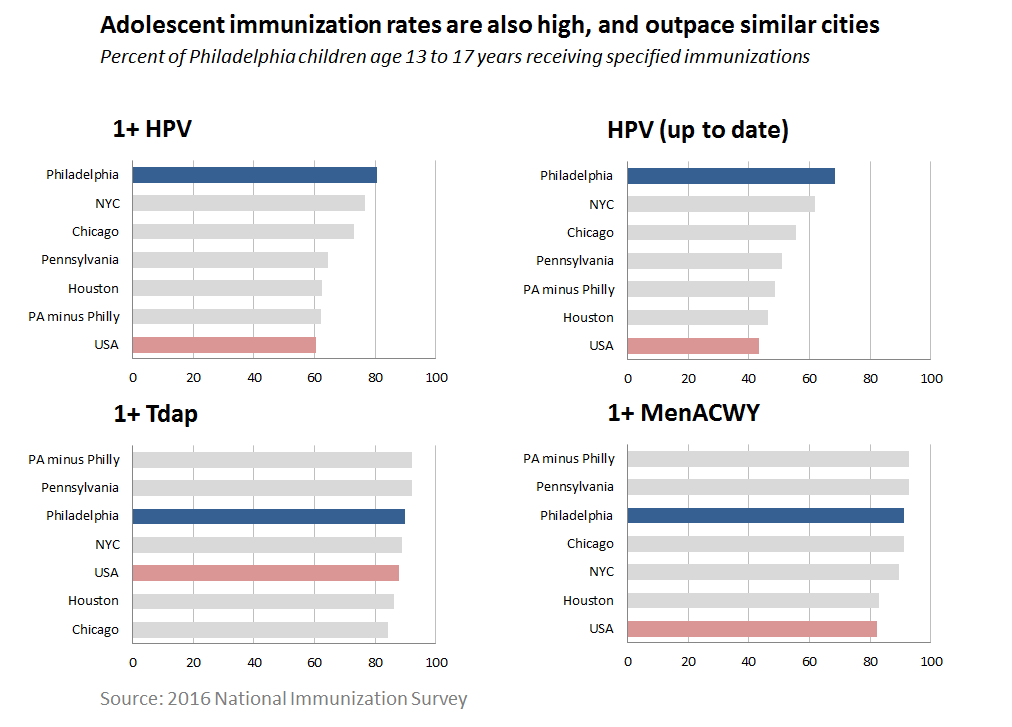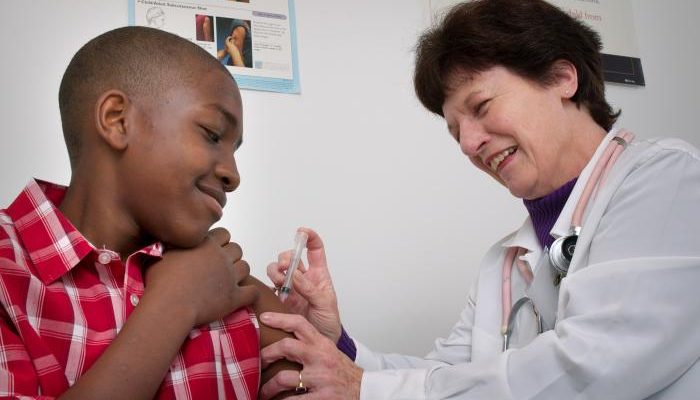The CDC has announced new data that show that Philadelphia is protecting its youngest, most vulnerable residents from dangerous diseases with immunization rates that are among the highest in the country. Philadelphia’s immunization rates are frequently higher than state and national rates.
The data, from the 2016 National Immunization Survey (NIS), covers children age 19 months to 35 months. The survey, done every year by the CDC, provides up-to-date estimates of vaccination for children and allows us to track rates of vaccinations over time.
Philadelphia is making great progress toward Healthy People 2020 goals
In Philadelphia, many of the immunization rates for different vaccines meet and exceed Healthy People 2020 goals, which are 10-year public health goals set by the federal government. Immunization rates for several other vaccines are close to meeting the goals, while a few – a birth dose of Hepatitis B vaccine and 2 doses of the Hepatitis A vaccine – lag behind the rest.

Meeting these goals means that Philadelphia maintains immunization rates that are high enough to greatly reduce the chance of disease outbreaks.
This is nothing new
For many important vaccines, Philadelphia’s infant immunization rates have been rising steadily. This reflects a long-term, concerted effort from health care providers and public health to ensure all children have access to vaccines.

Meanwhile, Polio, varicella, MMR, and Hepatitis B vaccines have had consistently high rates – our city has ongoing success providing long-term protection to Philadelphia’s most vulnerable residents.

Good news for teens, too!
These trends among Philadelphia infant immunization rates mirror those seen among adolescents, according to the NIS-Teen survey, which covers children age 13 to 17 years.
Philadelphia’s adolescent residents also have high rates for several key adolescent vaccines – as does Pennsylvania as a whole.

Immunization rates for adolescents have been high, and there’s been a marked increase in rates of the HPV vaccine among both girls and boys. This important vaccine prevents a sexually-transmitted disease that can cause cancer. Kids as young as age 9 can get the vaccine – there’s no such thing as getting this vaccine too early, but there is a such thing as getting it too late.

Why are these rates so good?
The Philadelphia Department of Public Health works to increase and maintain these vaccination rates by:
- Educating providers about recommendations
- Supporting providers with tools that help them identify, treat, and follow up with their patients
- Encouraging people to get their shots – and to vaccinate their children according to recommended schedules
- Distributing vaccines at no cost to providers, for them to administer to at-risk children and low-income adults
As a result of this work, Philadelphia has very low numbers of the diseases that these vaccines prevent – which shows that the high immunization rates are working by preventing outbreaks. It’s a sign that we need to keep up the good work.
It takes a village – so here’s how you can help
Keeping these immunization rates high means that we’re protecting ourselves – and each other – from dangerous diseases. When our city has high immunization rates, it means that:
- People who are immunized don’t get sick
- We help protect those that cannot be immunized due to certain medical conditions
- Students can stay in school, adults are able to keep working, and our society and economy save money by stopping diseases before they start
So what can you do?
- If you have kids, take them to the doctor and get them immunized to protect them and others
- Visit your doctor and ask about adult immunizations that might be right for you
- Get a flu shot every year
We have resources to help you learn how to get yourself or your children immunized, or you can just ask your doctor.

